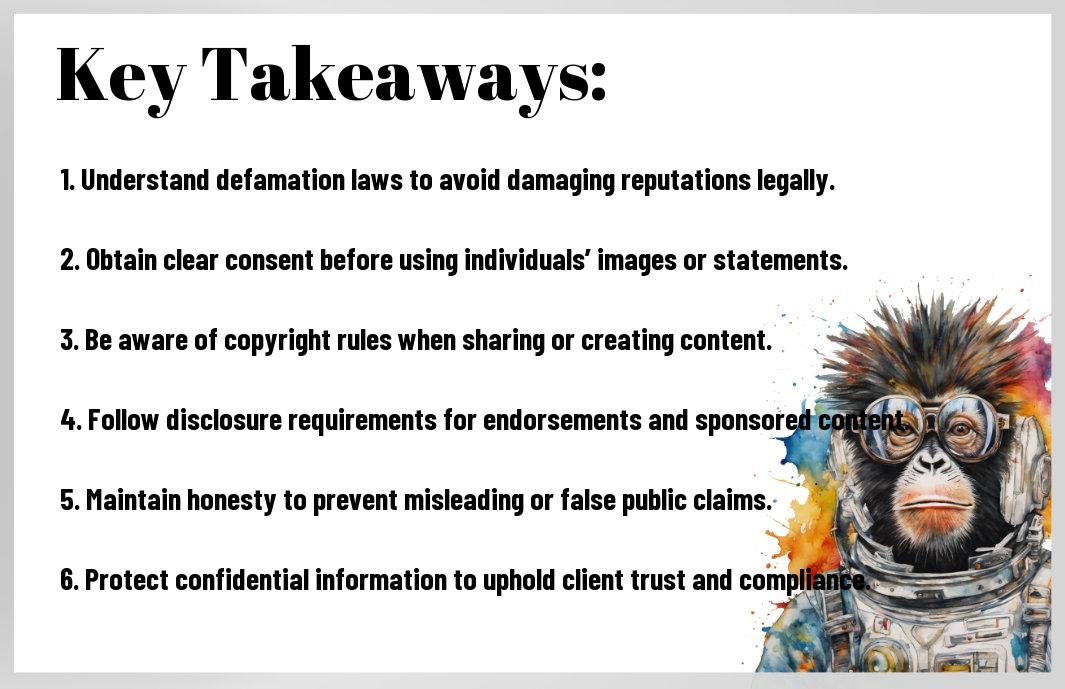Public Relations Law: Unlock What Every Pro Should Know
You need to understand the complex web of regulations and legal considerations that govern public relations to protect your brand and reputation effectively. Navigating defamation, intellectual property, and privacy laws can save you from serious legal pitfalls. By mastering these key areas, you’ll enhance your credibility and secure your communications strategy against potential lawsuits or compliance issues. This Public Relations Law knowledge not only empowers you to act confidently but also strengthens your professional practice in the ever-evolving media landscape.
Key Takeaways:
- Understanding defamation laws is imperative for protecting a client’s reputation while avoiding legal pitfalls.
- Accurate and transparent communication helps maintain trust and reduces the risk of legal disputes.
- Privacy rights and intellectual property laws must be respected when creating and distributing public relations materials.
- Knowledge of advertising regulations ensures that promotional content complies with legal standards.
- Contracts and agreements should be carefully reviewed to clarify obligations and rights between PR professionals and clients.
- Crisis communication strategies must consider legal implications to mitigate liability during sensitive situations.
- Staying informed about evolving laws and regulations helps public relations professionals adapt and maintain ethical practices.

Understanding Public Relations Law
Definition and Scope of Public Relations Law
The scope of public relations law encompasses the body of legal principles and regulations that govern how you communicate and interact with the public, media, and stakeholders. This area covers key aspects such as defamation, intellectual property rights, privacy laws, and contracts, all of which impact your capacity to manage an organization’s reputation effectively and ethically. By knowing what the law permits and prohibits, you can navigate complex situations while avoiding legal pitfalls that may threaten your professional integrity.
Your role in public relations intersects with multiple legal domains, making it imperative to understand boundaries around transparency, disclosure, and truthful communication. This knowledge empowers you to craft campaigns and messages that comply with legislation, protect your organization from potential lawsuits, and sustain public trust. By mastering these legal frameworks, you become better equipped to handle crises and build long-term positive relationships with your audience.
Historical Context of PR Law
Before public relations law became a distinct field, many of the regulations were scattered across various sectors, such as advertising and media law. Early legal challenges involved misleading advertisements and false claims, which gradually drew attention to the need for governing truthful communication practices in public relations. Over time, as PR evolved into a professional discipline, legal standards developed to address specific issues like libel, slander, and intellectual property that directly affect how information is disseminated.
Before you can appreciate current public relations law, it is important to recognize its roots in broader communication laws and the gradual formalization of ethical standards within PR organizations. Landmark legal cases and the creation of regulatory bodies have shaped the way you must approach messaging and public engagement, emphasizing accountability and verification to comply with the law.
Historical developments in public relations law reveal a trajectory toward greater legal oversight and refinement of ethical guidelines, which now form a vital part of your professional toolkit. This history not only informs present regulations but also guides you on how to adapt your strategies as laws continue to evolve in response to new communication technologies and societal expectations.
Importance of Legal Knowledge for PR Professionals
The definition of legal knowledge within your PR toolkit is that it provides a safeguard against inadvertent violations that could damage your career and your organization’s reputation. Understanding laws related to media relations, privacy, and advertising helps you make informed decisions and defend your campaigns against legal scrutiny. This legal insight also fortifies your ability to anticipate challenges, respond effectively to crises, and maintain the ethical standards expected by clients and the public.
In your day-to-day activities, legal knowledge prevents you from engaging in practices such as unauthorized use of copyrighted material or making defamatory statements, which can lead to costly litigation. The ability to interpret contracts, obtain necessary permissions, and ensure compliance with disclosure requirements is key to sustaining successful PR efforts. Ultimately, your legal acumen strengthens the credibility of your work and fosters trust among stakeholders.
Indeed, possessing a solid grasp of public relations law elevates your professional standing and confidence. This expertise not only limits your exposure to legal risks but also allows you to innovate responsibly within the boundaries of the law. As the media landscape changes rapidly, your commitment to legal literacy positions you as a reliable advisor who can navigate complex regulations and protect your organization’s interests effectively.

Key Legal Principles Relevant to Public Relations
Defamation and Libel
Any professional in public relations must navigate the complex waters of defamation law carefully. Between accurate representation and misinformation lies a thin line that can lead to costly legal challenges. Defamation involves making false statements that harm someone’s reputation, with libel referring specifically to written or published defamatory content. If your communication crosses this line, you could face lawsuits that damage not only your client’s image but also your own professional standing.
Understanding the elements that constitute defamation—including falsity, publication, injury, and fault—is necessary. Strong defenses, such as truth and opinion, may protect you, but these must be used with precision. By ensuring your messaging is truthful and fairly represents all parties involved, you minimize your exposure to defamation claims. Being proactive in fact-checking and cautious with sensitive information is a positive step in safeguarding your practice.
Privacy Rights and Publicity
Public relations efforts often require balancing the public’s right to know with individuals’ privacy rights. Public figures and private individuals alike have legal protections that you must respect to avoid infringing on their privacy or misappropriating their image for commercial gain. Public relations professionals must be particularly mindful when disseminating personal details or using someone’s likeness in campaigns.
Consent remains a key element when dealing with publicity rights, whether for endorsements, use of a person’s image, or private information. Violations can lead to lawsuits and damage to your credibility. Your responsibility is to secure proper permissions and to handle sensitive data with care and discretion, thereby upholding privacy laws and ethical standards in public relations.
A strong understanding of privacy laws, including federal and state-specific statutes, enhances your ability to craft campaigns that are both effective and lawful. This knowledge serves as a safeguard against legal pitfalls and fosters trust between you, your clients, and the public.
Intellectual Property Considerations in PR
By effectively utilizing intellectual property (IP) law, you protect creative content and authenticate original work within your campaigns. This encompasses copyrights, trademarks, and trade secrets that often form the foundation of your client’s brand identity and promotional materials. Unauthorized use of protected materials can lead to infringement claims, which can be damaging both legally and reputationally.
Ensuring that you have the rights to use logos, slogans, images, and media is a vital part of your role. Additionally, when creating original content, securing copyrights and trademarks strengthens your client’s market position. Your diligence in respecting IP rights supports innovation and distinguishes your campaigns in the competitive landscape.
Another vital factor is your ability to educate clients about IP risks and protections, positioning yourself as a strategic advisor in safeguarding their assets. Your foresight in addressing intellectual property considerations can prevent unexpected legal challenges and enhance the value of your campaigns.
Regulation of Advertising and Promotions
Besides compliance with general laws, public relations professionals must navigate the specific regulatory frameworks governing advertising and promotional activities. These laws, often enforced by governmental bodies such as the Federal Trade Commission (FTC), demand truthfulness, non-deceptiveness, and substantiation of claims in your communications. Failure to comply can lead to penalties, negative publicity, and loss of consumer trust.
The rules extend to endorsements, testimonials, contests, and sweepstakes, requiring transparency and fairness. Your role includes reviewing all promotional materials for compliance, ensuring disclaimers are clear, and representations are accurate. By doing so, you help maintain the integrity of your campaigns and protect your clients from regulatory sanctions.
Property rights and regulatory compliance are intertwined in promotion. Properly managing these aspects reinforces your position as a practitioner who not only creates compelling content but also respects and upholds legal standards, thereby fostering long-term client success.
Ethical Considerations in Public Relations Law
The Role of Ethics in PR Practices
Not every professional fully grasps how deeply ethics intertwine with public relations law. You must recognize that ethical conduct in PR isn’t merely about following the law—it’s about shaping public trust and maintaining your reputation over time. Ethical behavior involves transparency, honesty, and fairness in your communications and interactions with the media, clients, and the public.
Ethical principles guide your decisions in complex scenarios where legal boundaries might be ambiguous. By adhering to these principles, you establish yourself as a credible advocate, which in turn strengthens your legal standing. You should be aware that ethical lapses can quickly undermine your professional integrity, leading to legal consequences as well as loss of client confidence.
Balancing Truthfulness with Advocacy
Considerations in balancing truthfulness with advocacy are pivotal to your success as a PR professional. You have to promote your client’s interests vigorously without compromising honesty or misleading the public. This balance requires a nuanced approach where selective emphasis or omission does not cross into deception.
By upholding truthfulness while advocating effectively, you contribute to a transparent and informed public dialogue that benefits both your client and the community. Understanding this balance helps you avoid ethical pitfalls and legal challenges related to false claims or misrepresentations.
A key aspect to remember is that advocacy doesn’t grant a license for dishonesty. You should always base your messaging on verifiable facts and be ready to correct any inadvertent inaccuracies, maintaining your role as a trustworthy intermediary between your client and the public.
Consequences of Ethical Breaches
On the flip side, ethical breaches can have severe impacts on both your career and legal liabilities. You could face disciplinary action from professional bodies, civil lawsuits for defamation or fraud, and even criminal penalties in extreme cases. More immediately, you risk losing the trust of clients, colleagues, and the public, which is often irreparable.
When your ethical standards falter, you open the door to reputational damage that may overshadow any short-term gains achieved through unethical conduct. Your professional future depends heavily on maintaining consistent ethical standards, both to comply with the law and to foster meaningful relationships.
Consequences of these breaches extend beyond just penalties—they affect your ability to build long-term partnerships and position yourself as a leader in the PR field. Taking proactive steps to cultivate ethical awareness within your practice protects you and enhances your influence in the industry.
Crisis Management and Legal Implications
Strategic Communications in a Crisis
By developing a clear and well-structured strategy, you can navigate through turbulent moments with greater confidence and control. Crafting your messages to address stakeholder concerns proactively not only helps in managing public perception but also prevents misinformation from spreading. Timely, transparent communication fosters trust and can mitigate reputational damage before it escalates.
By aligning your communication plan with legal advice, you ensure that your statements comply with applicable laws and regulations. This alignment minimizes the risk of inadvertently exposing your organization to litigation or regulatory scrutiny. Balancing openness with legal prudence is imperative in maintaining a steady communication flow while safeguarding your organization’s interests.
Legal Risks in Crisis Situations
Strategic planning in crisis management should incorporate an understanding of the inherent legal risks that can emerge during sensitive situations. Inadequate or misleading disclosures may lead to claims of negligence, defamation, or breach of disclosure obligations. You need to be aware of regulatory requirements, such as those from securities or consumer protection agencies, which mandate accurate and timely reporting.
Strategic missteps can also result in violations of privacy laws or intellectual property rights, particularly when handling confidential or proprietary information under pressure. Having legal counsel involved early in your crisis response helps identify these risks and guides you in crafting messages that limit exposure to lawsuits or penalties.
Hence, a comprehensive crisis communication strategy must integrate legal assessments to avoid unintended consequences. By combining legal foresight with effective communication tactics, you can protect your organization’s reputation and mitigate financial and regulatory repercussions that often accompany poor crisis handling.
Case Studies of Crisis Management Failures
For a deeper understanding of what to avoid, examining notable failures in crisis communication reveals the impact of inadequate legal and strategic planning. These cases highlight how ineffective responses can exacerbate damage and invite costly legal battles.
- Volkswagen Emissions Scandal (2015): The company initially denied wrongdoing, leading to increased regulatory fines exceeding $30 billion and lasting reputational harm.
- BP Deepwater Horizon Oil Spill (2010): Delayed acknowledgment and minimization of the incident resulted in over $60 billion in cleanup costs, legal settlements, and a major public backlash.
- United Airlines Passenger Removal Incident (2017): Poor handling of a viral video showing forcible removal led to lawsuits, compensation payments over $200 million, and a damaged brand image.
- Toyota Unintended Acceleration Recall (2009-2011): Slow response and inconsistent communication caused substantial losses and legal claims surpassing $1 billion.
Understanding these examples emphasizes how a failure to address both public relations and legal issues concurrently can magnify the fallout you face. Integrating lessons from these high-profile crises helps you build resilience and avoid pitfalls that have historically compromised major organizations.
- Exxon Valdez Oil Spill (1989): The delayed response strategy resulted in a $5 billion cleanup and legal fees, alongside a lasting blow to Exxon’s reputation.
- Facebook Cambridge Analytica Scandal (2018): Failure to disclose data misuse led to regulatory penalties exceeding $5 billion, coupled with severe public trust erosion.

Navigating Regulatory Frameworks
Federal Trade Commission (FTC) Guidelines
Your understanding of the Federal Trade Commission (FTC) Guidelines is important to ensure your public relations campaigns comply with federal standards on truthful advertising and endorsements. Below, the FTC monitors marketing practices and is particularly vigilant about deceptive or misleading claims, especially when they involve endorsements or testimonials. You must disclose any material connections with endorsers to avoid violating these regulations.
Below, the guidelines extend into managing online influencer partnerships where transparency is paramount. As a PR professional, you need to accurately represent sponsored content and avoid any type of deceptive tactics that could mislead the public or consumers. Failure to do so can lead to significant penalties and damage to both your client’s and your professional reputation.
Securities and Exchange Commission (SEC) Regulations
Federal oversight by the Securities and Exchange Commission (SEC) shapes how you approach communications related to publicly traded companies. The SEC requires that any information that could influence an investor’s decision must be disclosed truthfully and promptly. Misstatements or omissions in press releases, earnings reports, or other material communications can trigger enforcement actions.
Federal regulations demand that your public relations activities for publicly held companies adhere strictly to these rules, especially within earnings announcements and other material events. You are responsible for ensuring accuracy and timely disclosure to maintain market integrity and protect investors.
Commission enforcement efforts emphasize that your corporate communications must align with SEC standards for transparency and fairness. This includes the obligation to avoid selective disclosure, meaning you cannot communicate material information to only certain individuals or groups before making it available to the general public.
State Laws Affecting Public Relations Practice
On a more localized level, state laws add an additional layer of regulation that you must navigate. These laws can vary widely and include restrictions on advertising, defamation, and privacy that influence your public relations strategies. You will need to adjust your approaches depending on the state jurisdiction to ensure compliance with relevant statutes.
On matters such as data privacy and wrongful publicity, states can impose stricter obligations than federal guidelines. It is imperative for your practice to stay informed about these and incorporate them into client advisories and campaign designs to avoid legal challenges.
Trade associations and local bar guidelines often provide resources that can help you interpret these complex variations in state legislation. By making use of these resources, you enhance your ability to implement effective, compliant PR campaigns that respect both federal and state regulatory environments.
The Role of Contracts in Public Relations
Understanding PR Contracts
Once again, the importance of contracts in public relations cannot be overstated. Any PR professional who seeks to protect their interests and establish clear working relationships must fully grasp the purpose and components of a well-drafted contract. These agreements serve as a formal understanding between you and your clients, outlining expectations, deliverables, timelines, and compensation. Without this, misunderstandings or disputes could arise, potentially damaging your reputation and business.
Any contract in your PR work becomes a key tool to manage risks and ensure accountability. You should always approach these documents with attention to detail, as they define your rights and obligations. Taking the time to understand the legal language and specific clauses will empower you to negotiate terms that align with your goals and shield you from unwanted liabilities.
Negotiating Terms and Conditions
Among the various phases of contract development, negotiating terms and conditions stands out as your opportunity to tailor the agreement to suit your professional needs. By engaging in thoughtful negotiation, you can secure terms that support fair payment schedules, performance metrics, and scope of work. This process also gives you a platform to clarify responsibilities, deadlines, and deliverable standards, which are important to maintaining a smooth collaboration.
Among the pitfalls you must avoid is accepting one-sided provisions that impose unreasonable demands or limit your flexibility. You are empowered to negotiate amendments that offer balance and protection, ensuring that both parties are held accountable and that the contract reflects a practical working relationship instead of just a legal formality.
Indeed, mastering negotiation is a powerful skill that boosts your confidence and increases your influence in securing agreements that benefit your career. Consider seeking legal advice for complex terms or when contract language seems ambiguous. This investment pays off by minimizing misunderstandings and fostering stronger client relationships founded on clearly agreed conditions.
Termination Clauses and Confidentiality Agreements
To safeguard your interests, contracts must include clear termination clauses specifying when and how either party may end the engagement. These provisions define notice periods, grounds for termination, and any penalties involved. Understanding these terms allows you to plan your exit strategy without unexpected consequences, preserving your professional integrity and minimizing financial risks.
To complement termination clauses, confidentiality agreements protect sensitive information that you and your clients exchange during your PR campaigns. Such clauses require you to keep proprietary data and strategic insights private, preventing unauthorized disclosure that could harm either party’s competitive position or reputation. Adhering to these agreements is fundamental to maintaining trust and your standing in the industry.
A thorough comprehension of termination and confidentiality provisions helps you anticipate and manage scenarios that could impact your work. Ensuring these clauses are fair and clearly written reinforces your security and professionalism. This approach ultimately builds stronger, more transparent partnerships where mutual respect and discretion are prioritized.
Conclusion
As a reminder, understanding Public Relations Law empowers you to navigate the complexities of communication within legal boundaries effectively. By familiarizing yourself with the key principles, including defamation, intellectual property rights, and privacy regulations, you can protect both your professional reputation and that of your clients. This knowledge ensures that your strategies comply with legal standards, helping you to anticipate potential risks and address them proactively.
Your expertise in Public Relations Law not only enhances your credibility but also strengthens your ability to craft messages that resonate while safeguarding against legal pitfalls. Staying informed about evolving regulations and case law will enable you to adapt your practices confidently, maintaining ethical integrity and fostering trust with your audience. Ultimately, your command of Public Relations Law is a foundational asset that supports your success in the field.
FAQ
Q: What is Public Relations Law?
A: Public Relations Law refers to the legal principles and regulations that govern how organizations communicate with the public, media, and other stakeholders. It includes laws related to defamation, intellectual property, advertising, confidentiality, and privacy, ensuring that communication practices comply with legal standards.
Q: Why is understanding Public Relations Law important for PR professionals?
A: Understanding Public Relations Law helps professionals avoid legal pitfalls, manage risks, and maintain ethical standards. It enables them to craft accurate messages, respect intellectual property rights, handle sensitive information properly, and respond effectively to legal challenges that may arise during communication campaigns.
Q: What are the common legal risks faced in public relations?
A: Common legal risks include defamation claims, copyright infringement, breach of confidentiality agreements, false advertising allegations, and violations of privacy laws. PR professionals need to be aware of these risks to prevent litigation and protect the reputation of their clients or organizations.
Q: How does defamation law affect public relations activities?
A: Defamation law protects individuals and entities from false statements that may harm their reputation. PR professionals must ensure that all public statements and materials are truthful and verifiable to avoid accusations of libel or slander, which can result in legal action and damage to credibility.
Q: What role does intellectual property law play in public relations?
A: Intellectual property law safeguards creative works such as logos, slogans, images, and written content. PR practitioners need to secure appropriate permissions and licenses when using third-party materials and protect their own original content from unauthorized use to maintain legal compliance.
Q: How should a PR professional handle confidential or sensitive information?
A: PR professionals must adhere to confidentiality agreements and ethical guidelines by protecting sensitive information from unauthorized disclosure. They should implement clear policies on information sharing and consult legal counsel when uncertain about what can be publicly released.
Q: Can PR campaigns be subject to advertising laws?
A: Yes, PR campaigns involving promotional messages or endorsements may be subject to advertising laws and regulations. These laws require honesty, substantiation of claims, and transparency, such as disclosing paid endorsements, to prevent misleading the public and ensure fair communication practices.
Authored by Team, PR CompaiPA



